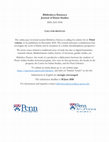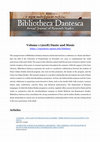Launch by Bibliotheca Dantesca

CALL FOR ARTICLES The online peer-reviewed journal Bibliotheca Dantesca is calling for articles f... more CALL FOR ARTICLES The online peer-reviewed journal Bibliotheca Dantesca is calling for articles for its Third volume, to be published on December 2020. The journal welcomes contributions that investigate the work of Dante and its reception in a widely interdisciplinary perspective. We invite essays related to traditional areas of study but also to digital humanities, material culture, Mediterranean studies, history of emotions, gender studies, etc. Bibliotheca Dantesca the result of a productive collaboration between the students of Penn's Italian Studies doctoral program, who were its first promoters, the faculty in the program, the Center for Italian Studies, and the Penn Libraries. To submit an article please go to our website page https://repository.upenn.edu/bibdant/ and click on "Submit Article" on the left. Submissions in English are strongly encouraged. The submission deadline is 30 June 2020.

Bibliotheca Dantesca, 2018
This inaugural issue of Bibliotheca Dantesca features articles derived from a conference on "Dant... more This inaugural issue of Bibliotheca Dantesca features articles derived from a conference on "Dante and Music" that was held at the University of Pennsylvania on November 5-6, 2015, to commemorate the 750th anniversary of the poet's birth. The essays in this collection explore both the presence of music in Dante's works and the reception of his poetry in musical repertoires throughout the centuries.
With the support of the Penn Libraries, Bibliotheca Dantesca represents the result of a productive collaboration between the students of Penn’s Italian Studies doctoral program, who were its first promoters, the faculty in the program, and the Center for Italian Studies. The journal's purpose is to produce scholarship that investigates the work of Dante and its reception in a widely interdisciplinary perspective. At Penn, the Italian Studies program and the Center actively collaborate in organizing events devoted to Dante, such as the Imelde Della Valle Lectures, Lecturae Dantis, talks, conferences, concerts, films, and theatrical performances. The Department of Romance Languages, of which the Italian Studies program is a section, regularly offers courses devoted to Dante and his world, in conjunction with the interdisciplinary program in Global Medieval and Renaissance Studies. Bibliotheca Dantesca thus consolidates the strong commitment of Penn and its Italian Studies community to Dante scholarship in a timely way, by starting its publication celebrating Dante's birth, and also looking ahead to the 2021 anniversary of his death.
is an international peer-reviewed journal dedicated to all tendencies in Dante studies. The annua... more is an international peer-reviewed journal dedicated to all tendencies in Dante studies. The annual volumes of the journal will host both essays related to traditional areas of study and contributions linked to research developed in recent decades, such as digital humanities, material culture, Mediterranean studies, history of emotions, gender studies, etc. The aim of the journal is to offer the scholarly world a series of interdisciplinary reflections that can contribute to the development of all aspects of contemporary work on Dante, particularly in view of the fastapproaching seventh centenary of the poet's death.
Conferences by Bibliotheca Dantesca

On April 16-17, 2018, the Center for Italian Studies and the Italian Studies Section of the Roman... more On April 16-17, 2018, the Center for Italian Studies and the Italian Studies Section of the Romance Languages Department will host "Strategies of Authority in Medieval and Renaissance Europe." The conference aims to investigate, from trans-national and interdisciplinary perspectives, different uses and applications of the principle of authority in Europe, from Dante to Galileo. The principle of authority is usually considered by scholars as a stumbling block in intellectual history, the target against which trailblazing writers, scientists, artists and philosophers needed to address their efforts. In reality, as this conference aims to demonstrate, in the early modern period the principle of authority was often re-shaped in order to provide support precisely to those who opposed it; it could intertwine with another crucial issue, authorship. Finally, the principle of authority could also help to empower narratives both for cultural and political purposes, e.g. through forgeries or their denunciation. Over the centuries under consideration in our conference, the principle of authority was continously revised, also because the humanistic turn dramatically enlarged the number of authorities to make appeal to, extending a pantheon until then limited to very few names (namely Aristotle and Cicero).
Some of the key questions our conference asks are: Which forms could the principle of authority take in different time and contexts? How does the principle of authority serve to shape our understanding both of the past and of readings of the present? When does the appeal to the principle of authority became a mere rhetorical game? How does the principle of authority interact with the notion of authorship?
Drafts by Bibliotheca Dantesca
Bibliotheca Dantesca, 2019
After the first special volume on “Dante and Music,” the online peer-reviewed journal Bibliotheca... more After the first special volume on “Dante and Music,” the online peer-reviewed journal Bibliotheca Dantesca is calling for articles for its second volume, to be published on December 2019. The journal welcomes contributions that investigate the work of Dante and its reception in a widely interdisciplinary perspective.











Uploads
Launch by Bibliotheca Dantesca
With the support of the Penn Libraries, Bibliotheca Dantesca represents the result of a productive collaboration between the students of Penn’s Italian Studies doctoral program, who were its first promoters, the faculty in the program, and the Center for Italian Studies. The journal's purpose is to produce scholarship that investigates the work of Dante and its reception in a widely interdisciplinary perspective. At Penn, the Italian Studies program and the Center actively collaborate in organizing events devoted to Dante, such as the Imelde Della Valle Lectures, Lecturae Dantis, talks, conferences, concerts, films, and theatrical performances. The Department of Romance Languages, of which the Italian Studies program is a section, regularly offers courses devoted to Dante and his world, in conjunction with the interdisciplinary program in Global Medieval and Renaissance Studies. Bibliotheca Dantesca thus consolidates the strong commitment of Penn and its Italian Studies community to Dante scholarship in a timely way, by starting its publication celebrating Dante's birth, and also looking ahead to the 2021 anniversary of his death.
Conferences by Bibliotheca Dantesca
Some of the key questions our conference asks are: Which forms could the principle of authority take in different time and contexts? How does the principle of authority serve to shape our understanding both of the past and of readings of the present? When does the appeal to the principle of authority became a mere rhetorical game? How does the principle of authority interact with the notion of authorship?
Drafts by Bibliotheca Dantesca
With the support of the Penn Libraries, Bibliotheca Dantesca represents the result of a productive collaboration between the students of Penn’s Italian Studies doctoral program, who were its first promoters, the faculty in the program, and the Center for Italian Studies. The journal's purpose is to produce scholarship that investigates the work of Dante and its reception in a widely interdisciplinary perspective. At Penn, the Italian Studies program and the Center actively collaborate in organizing events devoted to Dante, such as the Imelde Della Valle Lectures, Lecturae Dantis, talks, conferences, concerts, films, and theatrical performances. The Department of Romance Languages, of which the Italian Studies program is a section, regularly offers courses devoted to Dante and his world, in conjunction with the interdisciplinary program in Global Medieval and Renaissance Studies. Bibliotheca Dantesca thus consolidates the strong commitment of Penn and its Italian Studies community to Dante scholarship in a timely way, by starting its publication celebrating Dante's birth, and also looking ahead to the 2021 anniversary of his death.
Some of the key questions our conference asks are: Which forms could the principle of authority take in different time and contexts? How does the principle of authority serve to shape our understanding both of the past and of readings of the present? When does the appeal to the principle of authority became a mere rhetorical game? How does the principle of authority interact with the notion of authorship?